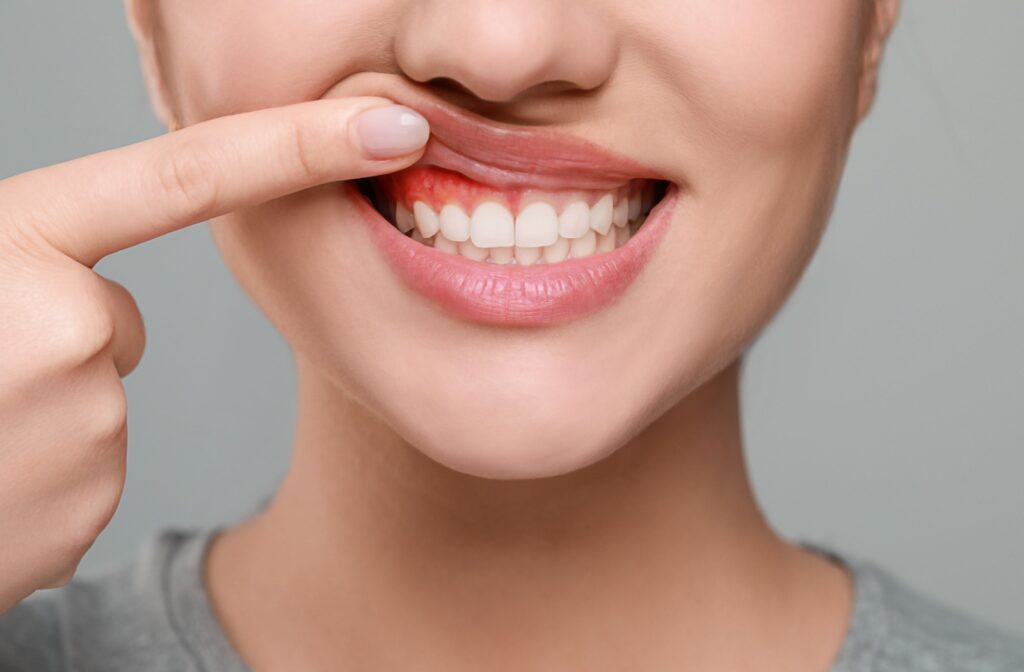Many people experience gum sensitivity at some point in their lives, but few realize just how crucial healthy gums are to overall dental health. Gums do more than anchor your teeth; they protect the roots and keep harmful bacteria at bay.
Gum pain can be caused by a variety of things, from simply brushing too hard to more serious issues like gingivitis. If you notice your gums feeling sensitive or inflamed for no apparent reason, it’s time to visit your dentist. They can rule out more serious issues and provide treatment if signs of oral health issues are present.
Common Causes of Gum Sensitivity
With gum sensitivity, you may experience symptoms like persistent soreness, redness, and inflammation. Sometimes, you might even notice gum recession or a metallic taste. Recognizing these symptoms early can make all the difference in addressing the issue before it escalates. This sensitivity can result from various factors, from everyday habits to underlying health conditions.
Gingivitis
Gingivitis is the mildest form of gum disease. It’s often caused by poor brushing and flossing habits that allow plaque to build up on the gum line. When plaque isn’t removed through regular brushing and flossing, it can harden into tartar, which can exacerbate irritation and inflammation.
Redness, swelling, and bleeding during brushing are telltale signs of gingivitis. Symptoms may vary in intensity, but even mild cases should not be ignored. If left untreated, gingivitis can lead to tooth loss and other serious health issues.
Brushing Too Hard
Brushing too hard is a common mistake many people make, often with the misguided intention of achieving a “deeper clean.” However, excessive pressure can cause gum recession, exposing the sensitive roots of the teeth and leading to increased sensitivity and discomfort.
Instead of aggressive techniques, use a gentle, circular motion with a soft-bristled toothbrush to remove plaque without damaging the gum tissue.
Hormonal Changes
Gum tenderness is common during pregnancy, menstruation, or menopause due to hormonal fluctuations that increase blood flow to the gums.
Maintaining a diligent oral care routine, including regular dental checkups and oral hygiene practices, can help mitigate the adverse effects of hormonal changes on gum sensitivity.
Poor Oral Hygiene
Poor oral hygiene is one of the leading causes of gum disease, creating an environment where plaque can thrive. Plaque is a sticky film that forms on teeth when bacteria combine with sugars from food. If not effectively removed through brushing and flossing, plaque can harden into tartar, which can only be removed by a dental professional.
The accumulation of plaque and tartar can inflame the gums, potentially leading to gingivitis and more severe forms of gum disease, including periodontitis. Brushing twice a day with fluoride toothpaste, daily flossing, and regular dental visits for professional cleanings are essential to help maintain healthy gums.
Tobacco Use
Smoking or using other tobacco products can significantly contribute to gum sensitivity. Tobacco restricts blood flow to the gums, impairing healing and making them more susceptible to infections.
Smokers are also at a higher risk for developing periodontal disease, which can exacerbate gum pain and discomfort. Quitting smoking can lead to improved gum health and reduced sensitivity over time.
Complications of Ignoring Gum Sensitivity
Ignoring gum sensitivity might seem tempting, especially if the pain is intermittent. However, doing so can lead to more serious complications over time.
What starts as gingivitis can evolve into periodontitis—a more severe gum disease. This stage involves the deterioration of the bone and tissue surrounding your teeth, potentially leading to tooth loss. Inflamed gums are also more susceptible to bacterial infections, which can enter the bloodstream and affect other parts of the body.
Dental health is closely linked to overall well-being. Studies suggest a connection between gum disease and systemic conditions like heart disease and diabetes, so keeping up with oral care practices is a significant part of maintaining overall physical health.
Tips for Soothing Gum Pain at Home
If you’re experiencing mild gum pain, there are several home remedies you can try to alleviate discomfort and promote healing.
- Saltwater rinse: A simple saltwater rinse can reduce bacteria and soothe sore gums. Dissolve a teaspoon of salt in a cup of warm water, swish it in your mouth for 30 seconds, and spit it out.
- Cold compress: Applying a cold compress to the outside of your cheek for 15 minutes can help reduce swelling and numb the area, providing temporary gum pain relief.
- Use a soft-bristled toothbrush: Switching to a soft-bristled toothbrush can prevent further irritation. Gentle brushing and flossing are key to maintaining oral hygiene without exacerbating gum sensitivity.
- Stay hydrated: Drinking water throughout the day helps wash away food particles and bacteria, which can contribute to gum pain and inflammation.
These tips can relieve gum pain but are not substitutes for professional dental care.
When to Seek Professional Help
While home remedies can be effective, persistent gum pain may require a professional touch. If gum pain doesn’t improve within a week or is accompanied by fever or severe swelling, it’s important to see a dentist.
Noticeable gum recession is a red flag for underlying issues that need professional evaluation. In addition to that, loose teeth can be a sign of advanced gum disease and require immediate dental attention.
Find Out What’s Causing Your Gum Pain
When left unchecked, gum issues can lead to severe complications affecting both your dental and overall health. Don’t wait until the pain becomes unbearable.
At Shawnessy Dental Centre, we’re committed to helping you achieve and maintain a healthy smile. Our team is here to support you with personalized care and professional advice. Book an appointment with us today and take the first step toward healthier gums.


